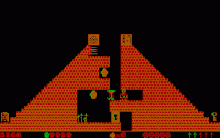Pharaoh's Tomb
Pharaoh's Tomb is a DOS platform game created by George Broussard and published by Apogee Software.
| Pharaoh's Tomb | |
|---|---|
 Screenshot of Level 1 | |
| Developer(s) | Micro F/X Software |
| Publisher(s) | Lone Star Micro (Pursuit) Apogee Software (Tomb) |
| Designer(s) | George Broussard |
| Engine | FAST |
| Platform(s) | DOS |
| Release | November 8, 1990 (Pursuit) December 14, 1990 (Tomb) |
| Genre(s) | Platform |
| Mode(s) | Single-player |
| Sound | PC Speaker |
| Display | CGA 320x200 |
The game uses CGA graphics based on the FAST (Fluid Animation Software Technology) engine. Notoriously, objects' positions are determined by their bounding volumes, not their pixel-precise positions on screen.[1]
The game was re-released in 2015 on Steam with support for Windows and macOS.
Plot
The protagonist, Nevada Smith (a play on Indiana Jones), is an archaeologist and adventurer who is exploring an Egyptian pyramid, hoping to find the Pharaoh's Tomb and get evidence of his findings.
Gameplay
In each level, the player navigates and avoids obstacles by jumping or falling, evading or killing enemies, and find keys to exit each level. Nevada Smith has no life bar, and is killed instantly when he touches enemies or traps. Nevada Smith can collect coins and masks for extra points. Lethal obstacles include pyramid-themed traps, such as blocks that fire projectiles when Smith passes in front of them, wall spikes, ceiling spikes, floor spikes, moving spikes, and wind. Navigational challenges include moving platforms and elevators. Bonus points are randomly concealed in some bricks, which are awarded when hit from below. Occasionally, Smith will become invisible, where only his hat will be visible. The game contains many dead ends as 'traps' where Smith can become permanently stuck, forcing the player to either quit or reload a saved game. Collecting manuscripts will cause blocks to appear (though they are occasionally traps), and invisible triggers will cause blocks to disappear (usually activated around masks). Collecting an 'F' will temporarily freeze all enemies and traps. Collecting 5 masks earns the player 11000 points and collecting 100 coins earns the player an extra life.
Release
The game started out as an 80-level commercial game called Pharaoh's Pursuit published by Lone Star Micro, before it was remade into a four-episode game, with the first episode being released as shareware. Each episode contains 20 levels, and each level consisting of a single room. The episodes are:
- "Raiders of the Lost Tomb" (a reference to Raiders of the Lost Ark)
- "Pharaoh's Curse"
- "Temple of Terror"
- "Nevada's Revenge"
The game was discontinued on March 2, 2000, and was released as freeware on March 20, 2009.[2]
A sequel, Arctic Adventure, based on the same engine, features Nevada Smith as the protagonist and has similar gameplay.
Reception
Computer Gaming World called Pharaoh's Tomb "lively and imaginative", praising the FAST engine's animation and level design. The magazine said that the low price of the full game made it an "outstanding value".[3]
Trivia
- George Broussard, the creator of the game, misspelled his own name on the title.
See also
- Monuments of Mars - A similar game, also published by Apogee but developed separately by Todd Replogie[4]
References
- Micro F/X Software (1990). Pharaoh's Tomb (DOS) (2.9 ed.). Apogee Software. Level/area: Instructions.
All moving objects are defined by a rectangular region around them.
- "Several old games released as Freeware". 3DRealms. Retrieved 26 March 2009.
- Lasky, Michael S. (March 1991). "Share the Wealth". Computer Gaming World. p. 63. Retrieved 17 November 2013.
- Broussard, George (2020-02-06). "Not the same engine! Todd Replogle had his own for Monuments of Mars and I wrote on in Turbo Pascal for Pharaoh's Tomb ;) But they were both very similar and CGA, so hard to tell!". @georgebsocial. Retrieved 2020-02-06.
External links
- Pharaoh's Tomb page at 3D Realms
- Pharaoh's Tomb at MobyGames